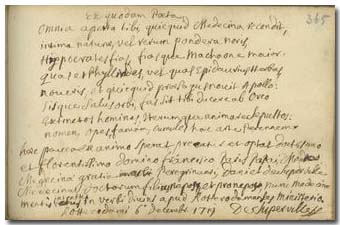
Ex quodam
Poeta
Omnia aperta tibi, quicquid Medicina recondit,
intima naturae, vel rerum pondera noris,
Hippocrates fias, fiasque Machaone maior,
quas et Phyllirides, vel quas Epidaurius Herbas,
noueris, et quicquid praesagus nouit Apollo:
Sisque salus orbi, fas sit tibi ducere ab Orco
Extinctos homines, iterumque animare sepultos:
nomen, opes, famam, cumules hac arte perennem.
haec pauca ex animo sperat precatur et optat doctissimo et
florentissimo domino Francisco Paris Papai, Medico, Medecinae
gratia peregrinanti, Daniel de Superville Medecinae doctorum
filius, nepos et pronepos, nunc medecinae mentis intentus in verbi
Diuini apud Rotterodamenses ministerio.
Rotterodami 6º Decembr. 1719
De Superville MP
|
* Those verses of the poem listing the
great predecessors are quite similar to verses 41-43 of the
laudatory poem written by Laurentius Ludenius to Johannes Georgius Gezelius
at the beginning of the work of the latter,
“J. A. Comenii Janua linguarum reserata aurea, in Graecum
idioma, vocabulis et loquendi modis sanctis translata,
Dorpati Livonorum 1648”:
Quas vel Phyllirides, vel quas Epidaurius herbas
Dignoscit: quicquid praesagus novit Apollo;
Quicquid et Hippocrates ponit, solersque Machaon.
|
|
|
From a certain poet.
Let everything open to you that Medicine keeps hidden, /
let the secrets of nature and the weight of the things be known to
you, / be Hippocrates, be greater than Machaon, / and know all the
herbs that were known to Chiron, son of Phyllira, Aesculap of
Epidaurus / and the oracle Apollo. / Be the healer of the world,
let it be allowed for you / to bring back the deceased from over
Orcus, and resuscitate the buried: / may you seize eternal name,
riches and fame through this art.
This few I wish, pray and desire from my heart
to the erudite and eminent Ferenc Pápai Páriz, who sets out to
peregrination for acquiring knowledge on medicine. Daniel de
Superville, son, grandson and grand-grandson of physicians, and
now preacher of the divine word for the healing of the soul among
the inhabitants of Rotterdam.
In Rotterdam, on December 6, 1719.
De Superville MP.
|
p. 365. Rotterdam, December 6, 1719
Superville, Daniel de, Sen.
(1657-1728), French Reformed
theologian in the Netherlands
Daniel de Superville. was born in Saumur in August
of 1657, the son of the Niort physician Jacques de S. (?-1679) and
of Marthe Pilet, grand-grandson of the physician Jean de
S., and uncle of the physician and polyhistor Daniel de S. (1696-1773).
The young Daniel began his studies in Saumur, reading Cartesian
philosophy, literature and geography. Then he changed for
theology, immatriculating in 1677 in Geneva, where he was
registered as “Salmuriensis, theol. stud., huic
albo nomen suum lubens apposuit”, that is, originating in Saumur,
student of theology, who willingly wrote his name in this
register”. He returned home in 1679, at the death of his father.
The persecution of the Protestants urged him to go to England, but
in 1683 he was invited to his native Loudun as a pastor. He worked
here two years, but then he was denounced because of his sermons,
and was summoned to Paris. After the revocation of the Edict of
Nantes (1685) his mother fled to the Netherland, and soon he also
had to leave France. In 1685 he became assistant pastor, and from
1691 pastor in Rotterdam. In commission of the Vallon Synod he
supported the widows of the exiled preachers. During the peace
conference of Utrecht (1713) he often travelled there in order to
negotiate with foreign embassadors about the possibility of the
restoration of the French Protestant church and release of
Protestants sent to galleys, and collected donations for
supporting those released. He retired in 1724 because of his
illness, and was followed in his office by his son Daniel de S. (1700-1762).
He died on June 9, 1728. His sermons and his monthly letters
issued from 1691 on were also published in a collective edition.
His great catechism of 1706 was reprinted several times; his book
on the Lord's Supper was translated into German by Johann
Gottfried Lessing. His works: Les veritez et les
devoirs de la réligion chrétienne, ou Catechisme pour
l'instruction de la jeunesse. Rotterdam, 1706. Amsterdam,
1708. – Le vrai communiant ou Traité de la Sainte cène et des
moiens d'y bien participer. Rotterdam, 1718. De ware
disgenoot aan des Heren tafel of verhandeling van 't H. Avondmaal
… Rotterdam, 1722. Geistreiche Betrachtungen von dem würdigen
Gebrauche des heiligen Abendmahls … ins Teutsche übersetzt
… von M. Johann Gottfried Lessing. Budissin [Bautzen], 1728. -
Sermons sur divers textes de l'Écriture Sainte. Rotterdam,
1724, 1726. 4 vol.
The son of Superville, at that time student of
theology, wrote in the album some days earlier in Leiden (p.
403).
•
Jöcher • LivrGen I 234 • Michaud • NNBW V 839 |

